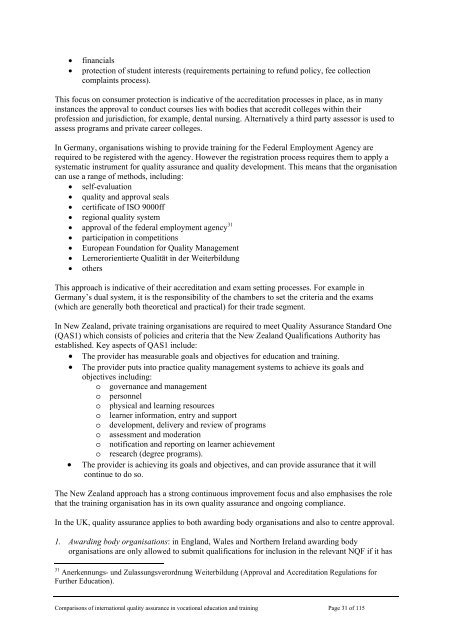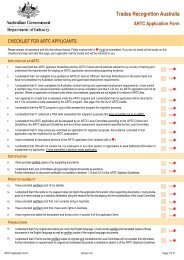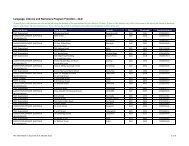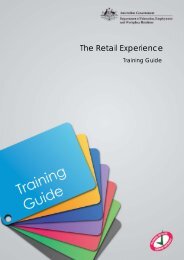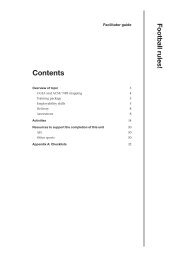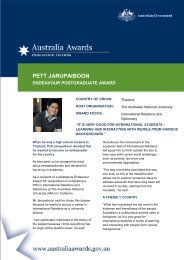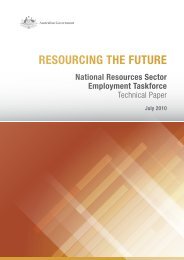Review - Department of Innovation, Industry, Science and Research
Review - Department of Innovation, Industry, Science and Research
Review - Department of Innovation, Industry, Science and Research
Create successful ePaper yourself
Turn your PDF publications into a flip-book with our unique Google optimized e-Paper software.
• financials<br />
• protection <strong>of</strong> student interests (requirements pertaining to refund policy, fee collection<br />
complaints process).<br />
This focus on consumer protection is indicative <strong>of</strong> the accreditation processes in place, as in many<br />
instances the approval to conduct courses lies with bodies that accredit colleges within their<br />
pr<strong>of</strong>ession <strong>and</strong> jurisdiction, for example, dental nursing. Alternatively a third party assessor is used to<br />
assess programs <strong>and</strong> private career colleges.<br />
In Germany, organisations wishing to provide training for the Federal Employment Agency are<br />
required to be registered with the agency. However the registration process requires them to apply a<br />
systematic instrument for quality assurance <strong>and</strong> quality development. This means that the organisation<br />
can use a range <strong>of</strong> methods, including:<br />
• self-evaluation<br />
• quality <strong>and</strong> approval seals<br />
• certificate <strong>of</strong> ISO 9000ff<br />
• regional quality system<br />
• approval <strong>of</strong> the federal employment agency 31<br />
• participation in competitions<br />
• European Foundation for Quality Management<br />
• Lernerorientierte Qualität in der Weiterbildung<br />
• others<br />
This approach is indicative <strong>of</strong> their accreditation <strong>and</strong> exam setting processes. For example in<br />
Germany’s dual system, it is the responsibility <strong>of</strong> the chambers to set the criteria <strong>and</strong> the exams<br />
(which are generally both theoretical <strong>and</strong> practical) for their trade segment.<br />
In New Zeal<strong>and</strong>, private training organisations are required to meet Quality Assurance St<strong>and</strong>ard One<br />
(QAS1) which consists <strong>of</strong> policies <strong>and</strong> criteria that the New Zeal<strong>and</strong> Qualifications Authority has<br />
established. Key aspects <strong>of</strong> QAS1 include:<br />
• The provider has measurable goals <strong>and</strong> objectives for education <strong>and</strong> training.<br />
• The provider puts into practice quality management systems to achieve its goals <strong>and</strong><br />
objectives including:<br />
o governance <strong>and</strong> management<br />
o personnel<br />
o physical <strong>and</strong> learning resources<br />
o learner information, entry <strong>and</strong> support<br />
o development, delivery <strong>and</strong> review <strong>of</strong> programs<br />
o assessment <strong>and</strong> moderation<br />
o notification <strong>and</strong> reporting on learner achievement<br />
o research (degree programs).<br />
• The provider is achieving its goals <strong>and</strong> objectives, <strong>and</strong> can provide assurance that it will<br />
continue to do so.<br />
The New Zeal<strong>and</strong> approach has a strong continuous improvement focus <strong>and</strong> also emphasises the role<br />
that the training organisation has in its own quality assurance <strong>and</strong> ongoing compliance.<br />
In the UK, quality assurance applies to both awarding body organisations <strong>and</strong> also to centre approval.<br />
1. Awarding body organisations: in Engl<strong>and</strong>, Wales <strong>and</strong> Northern Irel<strong>and</strong> awarding body<br />
organisations are only allowed to submit qualifications for inclusion in the relevant NQF if it has<br />
31 Anerkennungs- und Zulassungsverordnung Weiterbildung (Approval <strong>and</strong> Accreditation Regulations for<br />
Further Education).<br />
Comparisons <strong>of</strong> international quality assurance in vocational education <strong>and</strong> training Page 31 <strong>of</strong> 115


